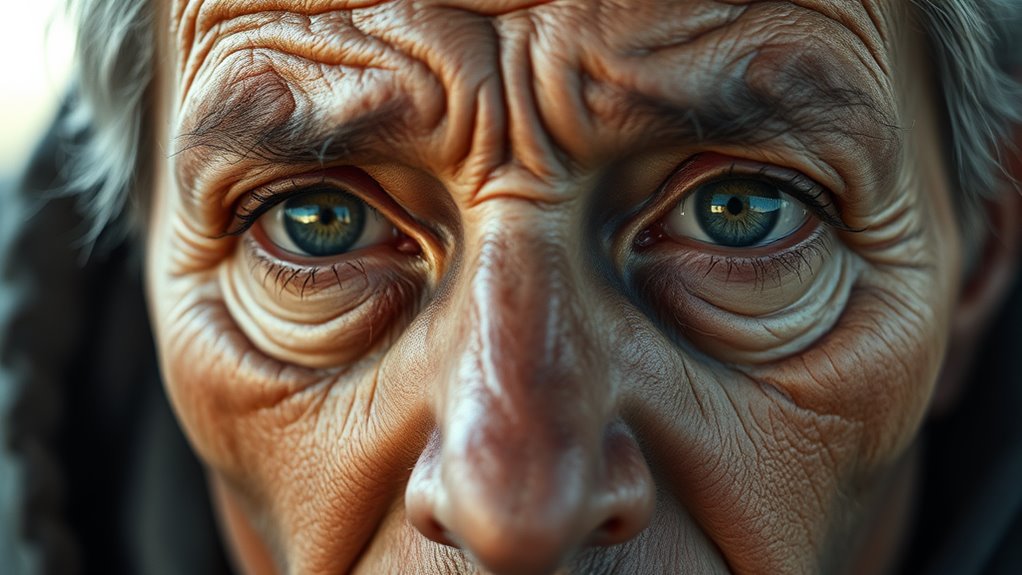The Surprising Way Stress Ages Your Skin Faster
Have you ever wondered why your skin seems to age faster when you’re stressed? Stress doesn’t just affect your mood; it triggers a cascade of physiological changes that can compromise your skin’s health. Elevated cortisol levels lead to inflammation and disrupt your skin’s barrier, resulting in moisture loss and premature signs of aging. Understanding this connection is crucial, and knowing how to combat it can make a significant difference in your skin’s appearance.
Key Takeaways
- Stress elevates cortisol levels, disrupting the skin barrier and leading to moisture loss and increased sensitivity.
- Chronic stress triggers inflammation, causing flare-ups in skin conditions and heightened redness or irritation.
- Elevated cortisol reduces collagen production, resulting in fine lines, wrinkles, and loss of skin elasticity.
- Stress contributes to premature aging by increasing oxidative stress, damaging skin cells and leading to a dull appearance.
- Effective stress management through exercise, mindfulness, and a balanced diet can significantly improve skin health and reduce aging effects.
The Impact of Stress on Skin Health
How does stress really affect your skin?
When you’re under stress, your body produces higher levels of cortisol, which can lead to inflammation and disrupt your skin’s natural barrier. This disruption allows moisture loss, resulting in dryness and increased sensitivity. Moreover, stress can trigger breakouts by increasing oil production, leading to clogged pores. Over time, these factors contribute to premature aging, manifesting as fine lines, wrinkles, and uneven skin tone. You may notice that your skin appears dull and tired, reflecting the stress you’re experiencing. Additionally, stress management is essential for maintaining healthy, youthful skin, as it can significantly reduce the negative impact of stress on your complexion.
Understanding Cortisol and Its Effects
What happens to your body when stress triggers a surge in cortisol?
This hormone, produced by your adrenal glands, plays a critical role in your body’s response to stress.
Elevated cortisol levels can lead to various physiological changes, including increased blood sugar, suppressed immune function, and altered fat distribution.
Elevated cortisol levels can trigger significant physiological changes, impacting blood sugar, immune function, and fat distribution.
These changes can manifest on your skin, resulting in a loss of elasticity, dryness, and premature aging.
Cortisol also affects collagen production, contributing to fine lines and wrinkles. Additionally, recognizing skin stress is essential for managing its impact on your overall skin health.
The Connection Between Stress and Inflammation
Have you ever noticed how stress seems to trigger flare-ups of skin conditions like acne or eczema?
This connection stems from stress-induced inflammation, which can exacerbate skin issues.
When you’re stressed, your body releases inflammatory cytokines, leading to increased redness and irritation.
Here are four ways stress contributes to inflammation:
-
Cortisol Release: Elevated cortisol levels heighten inflammatory responses.
-
Oxidative Stress: Stress increases free radicals, damaging skin cells.
-
Compromised Barrier: Stress weakens the skin barrier, making it more susceptible to irritants.
-
Immune Response: Stress can dysregulate your immune system, worsening skin conditions.
Incorporating soothing ingredients into your skincare routine can help combat these effects and promote relaxation.
How Stress Affects Collagen Production
Ever wondered why stress can leave your skin looking older? When you’re stressed, your body produces higher levels of cortisol, a hormone that negatively impacts collagen production. Collagen is essential for skin elasticity and firmness.
Elevated cortisol levels lead to increased breakdown of collagen fibers, reducing their integrity and leading to wrinkles and sagging skin.
Additionally, stress can decrease the production of fibroblasts, the cells responsible for collagen synthesis. This double whammy accelerates the aging process, making your skin appear dull and tired. Moreover, dietary choices can also play a significant role in exacerbating stress-related skin issues.
Managing stress is crucial for maintaining healthy collagen levels and youthful skin.
Practical Tips for Managing Stress
Here are four practical tips that can help you reduce stress levels:
-
Exercise Regularly: Engaging in physical activity releases endorphins, which can improve your mood and lower stress.
-
Practice Mindfulness: Try meditation or deep-breathing exercises to center your thoughts and calm your mind.
-
Maintain a Balanced Diet: Consuming nutrient-rich foods supports both mental and physical health, reducing stress.
-
Get Sufficient Sleep: Aim for 7-9 hours of quality sleep per night to promote recovery and overall well-being. Inadequate sleep can lead to premature aging and other skin issues.
Implementing these strategies can help safeguard your skin from stress-induced damage.
Skincare Strategies for Stress-Aged Skin
What steps can you take to combat the visible effects of stress on your skin?
Start by hydrating adequately; water helps maintain skin elasticity.
Incorporate antioxidants like vitamins C and E into your routine to combat oxidative stress.
Use a gentle cleanser to avoid irritation, and consider a moisturizer with hyaluronic acid for hydration.
Regular exfoliation can promote cell turnover, while sunscreen protects against further damage.
Don’t underestimate the power of a consistent sleep schedule; quality sleep supports skin repair. Unlocking radiant skin can be achieved by optimizing your sleep environment.
Lastly, mindfulness practices can reduce stress levels, which in turn may improve your skin’s appearance by reducing cortisol production.




